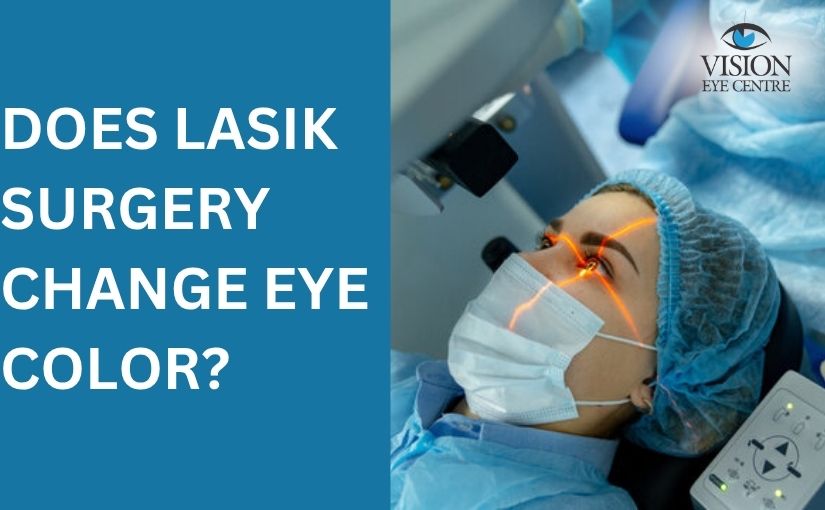
Does LASIK Surgery Change Eye Color?
Oct 22, 2025
LASIK surgery is one of the most advanced and trusted procedures to correct vision problems like nearsightedness, farsightedness, and astigmatism. Many people who are considering LASIK often wonder — does LASIK surgery change eye color? This question is common, especially among those who love their natural eye shade and worry about any cosmetic changes after surgery.
The simple answer is No, LASIK surgery does not change your eye color. The procedure focuses on reshaping the cornea — the clear, outer layer of the eye — and does not touch or affect the iris, which determines your eye color. Let’s understand this in detail.
Understanding LASIK Surgery
LASIK (Laser-Assisted In Situ Keratomileusis) is a modern laser eye surgery used to correct vision problems such as nearsightedness, farsightedness, and astigmatism. The surgery reshapes the cornea — the transparent, dome-shaped surface at the front of your eye — to help light focus properly on the retina.
Here’s how the procedure works:
-
The doctor applies numbing eye drops.
-
A thin flap is created in the cornea using a microkeratome or femtosecond laser.
-
A cool laser beam is used to reshape the corneal tissue.
-
The flap is placed back without stitches, and the eye heals naturally.
The entire process takes about 15–20 minutes for both eyes, and patients can often see improvements in vision within 24–48 hours.
How Eye Color Is Determined
Eye color is determined by genetics and the amount of melanin in the iris — the colored part of the eye.
-
People with more melanin have darker eyes (brown or black).
-
Those with less melanin have lighter eyes (blue, green, or gray).
The iris is located behind the Cornea and in front of the lens, which means it is not affected by LASIK surgery.
Since LASIK only reshapes the cornea (a transparent layer), it does not influence the pigmentation or structure of the iris. Therefore, your natural eye color remains the same before and after surgery.
Why do People think LASIK Changes Eye Color
Despite the facts, some patients notice a slight change in the appearance of their eyes after LASIK and assume that their eye color has changed. However, this is usually an optical illusion caused by temporary changes during the healing process.
Here are some possible reasons why your eye color may appear different after LASIK:
1. Reduced Redness and Inflammation
Before LASIK, people who wear contact lenses regularly might have slightly red or irritated eyes. After surgery, when they stop using contacts, the redness disappears, and the whites of the eyes look clearer, making the eye color appear brighter or more vivid.
2. Improved Clarity of the Cornea
LASIK improves the smoothness and transparency of the cornea, allowing more light to enter and reflect off the iris. This can make the eyes look sharper and more defined, creating the illusion of a color change.
3. Lighting and Pupil Size
Lighting conditions can greatly affect how your eye color appears. Under bright light, your pupils shrink, showing more of the iris and making the eyes look lighter. After LASIK, because vision clarity improves, patients often become more aware of these lighting effects.
4. Photography and Reflection
Post-LASIK eyes often appear more reflective or shiny in photos because the surface of the cornea is smoother. This reflection may slightly alter how the eye color looks in pictures, but it’s not an actual change in pigment.
What LASIK Actually Changes
While LASIK doesn’t alter your eye color, it does bring several vision-related benefits. The surgery:
-
Corrects refractive errors (myopia, hyperopia, astigmatism)
-
Reduces or eliminates dependence on glasses or contact lenses
-
Improves clarity of vision
-
Provides long-term visual stability
After recovery, most people experience improved eyesight almost immediately and notice a better quality of life.
If you’re considering LASIK Eye Surgery in Delhi, it’s important to consult an experienced specialist who can evaluate your eyes, explain the process clearly, and ensure it’s suitable for you.
What LASIK Does Not Do
To clear any confusion, here’s what LASIK does not change:
-
Eye color: The iris remains unaffected.
-
Shape of the eyeball: It only reshapes the cornea’s front surface.
-
Eye health conditions: LASIK doesn’t cure issues like cataracts, glaucoma, or retinal problems.
-
Facial appearance: There’s no change in eye size or appearance beyond clearer, more vibrant eyes due to better corneal transparency.
What If You Want to Change Eye Color?
While LASIK cannot change eye color, there are other methods (though not recommended) that claim to alter it. These include:
-
Colored contact lenses: A Safe and temporary way to change your eye color.
-
Artificial iris implants: A surgical method where an artificial iris is placed inside the eye. However, this procedure carries high risks — including inflammation, vision loss, and Glaucoma — and is not approved for cosmetic use in many countries.
-
Laser depigmentation (experimental): Some clinics claim to lighten dark eyes by targeting melanin, but this is controversial and potentially dangerous.
Hence, if your goal is only cosmetic, it’s better to use colored contact lenses under the guidance of an eye specialist.
Possible Temporary Effects After LASIK
Though LASIK doesn’t change eye color, some temporary side effects might make your eyes look slightly different for a short time:
-
Mild redness or dryness
-
Slight swelling of the eyelids
-
Light sensitivity
-
Watery eyes
These effects generally disappear within a few days or weeks after surgery. Once your eyes heal completely, they will look and feel normal again.
Post-LASIK Eye Appearance Improvements
Even though your eye color doesn’t change, you may notice your eyes look brighter and healthier after LASIK. This is mainly because:
-
The cornea becomes smoother, making eyes appear clearer.
-
Reduced dryness or redness enhances the natural eye tone.
-
Improved overall health and confidence reflect in your eyes.
So, while LASIK doesn’t modify the color, it can enhance the natural beauty of your eyes through improved vision and clarity.
Precautions After LASIK Surgery
To ensure the best results and maintain healthy eyes after LASIK:
-
Avoid rubbing your eyes for a few weeks.
-
Use prescribed eye drops regularly.
-
Wear protective eyewear when outdoors.
-
Avoid swimming or makeup for 1–2 weeks post-surgery.
-
Go for follow-up check-ups as recommended by your doctor.
Following these guidelines ensures faster healing and prevents complications.
Conclusion
In summary, LASIK surgery does not change your eye color. The procedure reshapes the cornea — the transparent outer surface — and has no impact on the iris, which determines eye color. Any perceived change is due to improved corneal clarity, lighting, or photography.
If you are planning to undergo LASIK eye surgery, consulting experienced specialists at Vision Eye Centre can help you achieve crystal-clear vision with complete safety. Their team of the best eye doctor in Delhi ensures personalized care, modern laser technology, and a smooth recovery process.
Your eyes remain the same beautiful color they always were — just sharper, clearer, and healthier after LASIK.
Frequently Asked Questions
1. Does LASIK surgery change eye color?
No, LASIK does not change your eye color. The surgery affects only the cornea and not the iris, which is responsible for your eye color.
2. Can LASIK surgery make my eyes look lighter or brighter?
Sometimes eyes may appear brighter after LASIK due to clearer corneas and reduced redness, but the actual color remains the same.
3. Can LASIK change brown eyes to blue?
No. LASIK cannot alter melanin levels or pigmentation. Brown eyes remain brown after the surgery.
4. Why do my eyes look different after LASIK?
Your eyes may appear clearer or shinier after surgery because the cornea becomes smoother and more transparent.
5. Is there any surgery that can change eye color?
Some experimental surgeries and lasers claim to change eye color, but they are risky and not recommended by eye health experts.
6. Will my vision or eye color fade with time after LASIK?
Your eye color will stay the same. Vision results from LASIK are usually long-lasting, though some people may need minor adjustments later in life.
7. Is LASIK safe for all eye colors?
Yes, LASIK is safe for all eye colors — whether brown, blue, green, or hazel — since it does not affect pigmentation.

